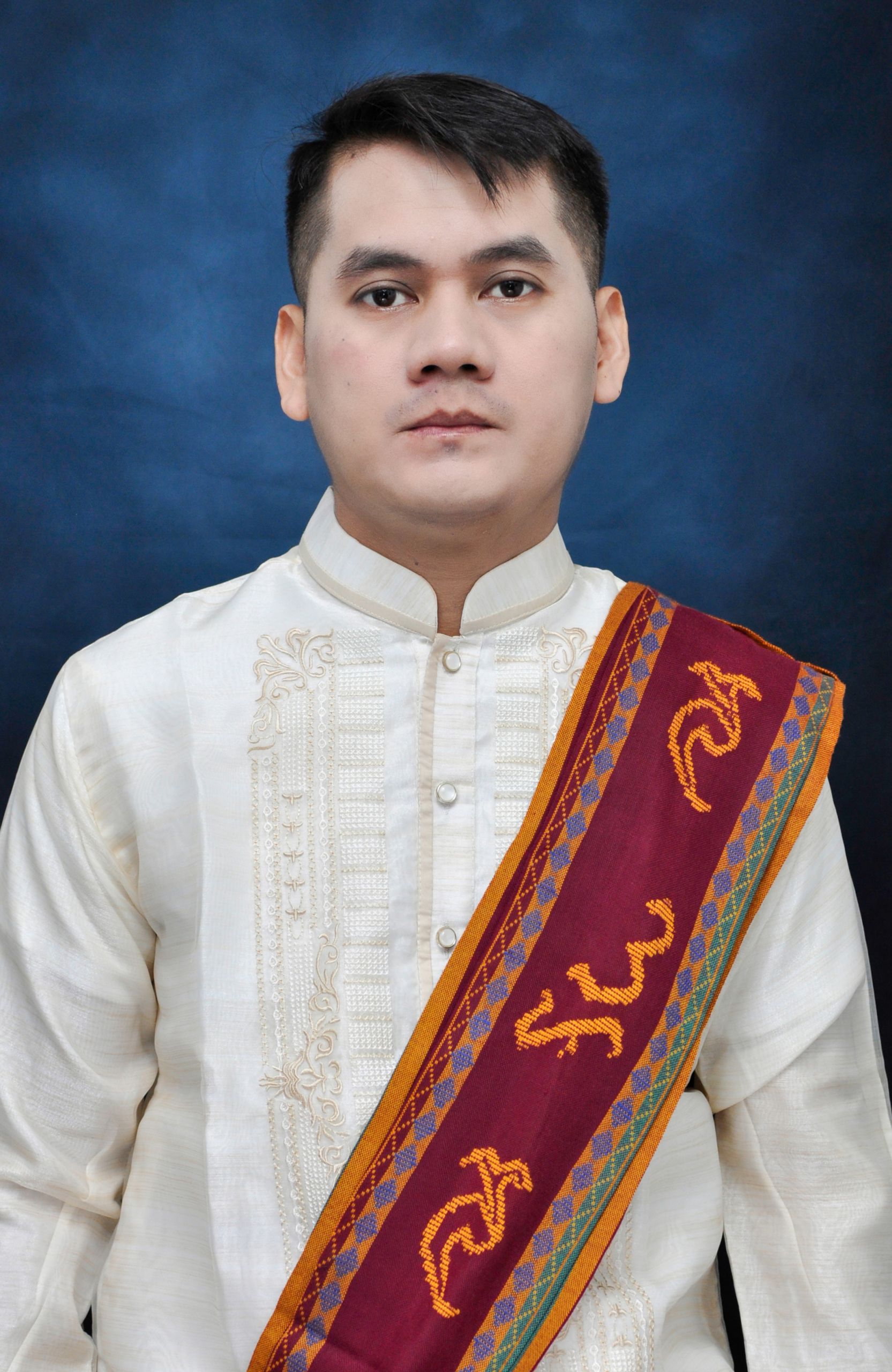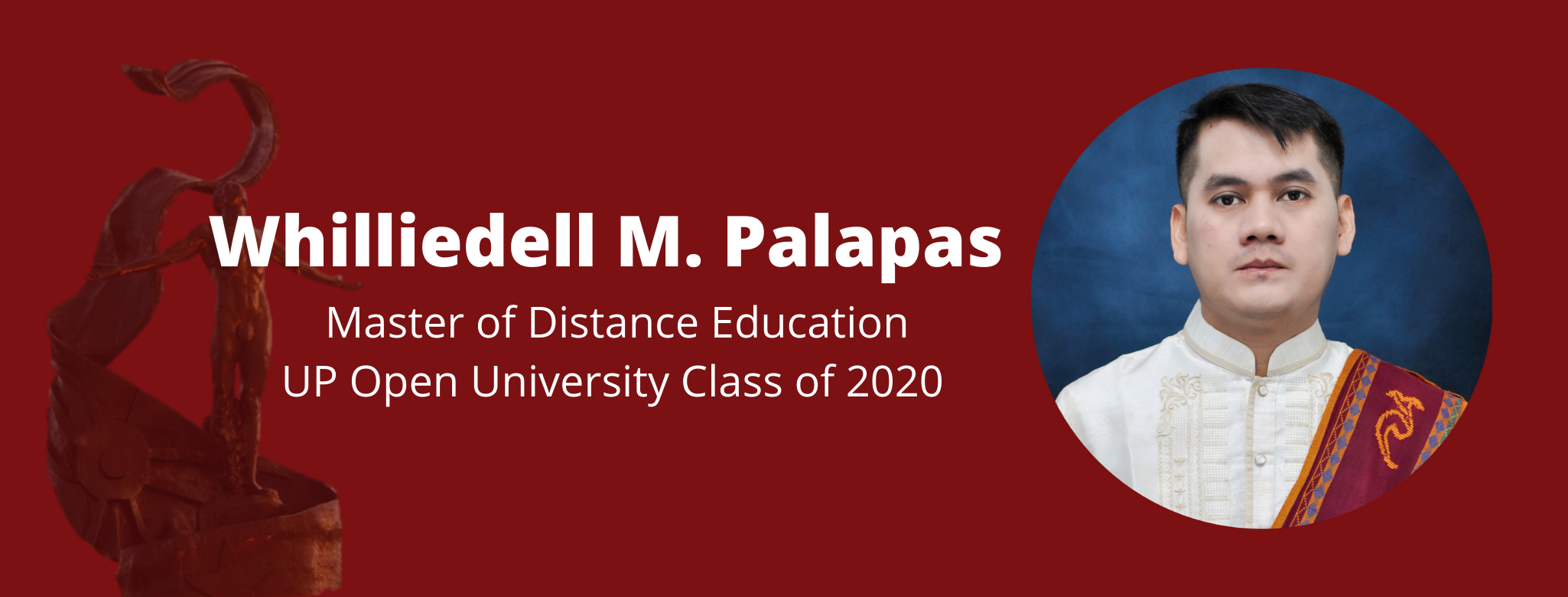This year, the world stopped so life can continue.
Since the first recorded case in the country back in January, the Covid-19 pandemic has drawn out the challenges and risks of systems and status quos. Education was one of the many sectors caught in surprise as it grappled to continue learning for all and still enforce preventive measures.
With the Philippine community quarantine classifications initially changing every 15th day, the trifocal education system, consisting of the Department of Education (DepEd), the Commission on Higher Education (CHED), and the Technical Education and Skills Development Authority (TESDA), was eyeing what perhaps is the only viable solution at the moment—distance education (DE).
As part of the UP Open University’s (UPOU) Class of 2020 and the sole graduate of the Master of Distance Education (MDE) program, Whilliedell Palapas vows to contribute to the practice and development of the field as disruptions continue to threaten the traditional learning mode.
Disruptions
Schools were shut down when the WHO declared the outbreak a pandemic, affecting over 58 million people worldwide and counting. In the Philippines, formal and informal educational institutions have closed their doors in March. This comes before the usual end-of-school-year rites are held in basic and higher education institutions following the old academic calendar. Moreso, the start of the school year, usually beginning in June, was also delayed to October for basic education, while CHED granted higher education institutions (HEIs) the freedom to decide theirs.
The United Nations Educational, Scientific and Cultural Organization (UNESCO) has identified several adverse effects of the school closure, noting how the sudden shift to DE pressures all members of the unprepared community. As global and local governments look to DE to mitigate the disruptions caused by the pandemic in the education sectors, the Philippines have also looked to UPOU to lead and guide institutions in this transition. While UPOU is mandated, capable, and ready to do so, it also has a more sustainable solution.
The Master of Distance Education
UPOU has instituted the Master of Distance Education (MDE) program in 2006 with the goal of producing professionals and educators adept at designing, managing, and evaluating DE programs. MDE also formalizes UPOU’s history of DE interventions into a comprehensive postgraduate degree and graduate certificate program.
Whilliedell Palapas recounts how he decided to enroll in the program, noting “…the MDE offered by the University of the Philippines stirred my interest more. Back then, I [already] believed that distance teaching and learning would be a mainstream in the future given the rapid advancement in technology and improved pedagogical approaches that new technology offered.”
Many governments recognize the promise of DE in these turbulent times because of its flexibility. DE can be delivered through various modes, such as online, electronic, print, audio, and audio-visual. DepEd currently uses a mix of online, print, and audio-visual in delivering quarterly learning modules and tasks. On the other hand, CHED and TESDA allows for a flexible learning approach where various modalities can be used depending on the contexts of institutions.
Since many learners are currently new to DE, expectations may clash with what it actually is. Distance is a defining feature of DE with learners and teachers separate from each other in time, in space, or in most cases, both. As Palapas progressed into the program, he also noticed that this feature of DE is what is most challenging. “I mostly relied on my independence and capacity as a student to learn the content of the course”, he wrote in an interview correspondence.
Dr. Maria Rowena D.R. Raymundo, MDE Program Chair, explains how she manages the expectations of new DE students and writes that course guides in DE institutions are formatted to be more detailed than those given in residential ones. In fact, course guides are further complemented by study guides in the former.
“The MDE/GCDE program regularly holds an orientation for new students to explain how the courses and the program are conducted, but for the current batch which is thrice the size due to a spike in enrollment, we also held a synchronous Zoom Orientation with a Q and A session to further clarify and explain program policies.” she adds.
Access to Educational Opportunities
Even before the Covid-19 pandemic, DE has been one of the modalities expected to widen access to educational opportunities, especially for learners with limiting situations but who seek to further their studies. More recently, DE served as an option to continue learning amid a public health crisis.
However, there are over 28 million Filipino learners affected by the pandemic and the school closures. Of those, only 89 percent of students from the past academic year were able to enroll in basic education according to DepEd. On the other hand, the Philippine Association of State Universities and Colleges (PASUC) estimates that 44,000 undergraduate and 6,000 graduate students in State Universities and Colleges (SUCs) will be out-of-school.
Still, Palapas maintains that the Covid-19 pandemic can be seen as an “opportunity” for the field of DE and the Philippine education system. The situation has allowed for more inquiries and exploration after forcing the education sectors to adapt to the new normal.
“…DE is now part of the new normal in education and as part of the new normal, it may continue to revolutionize the way we teach and learn. DE proves that no matter where someone is, no matter how the world goes into chaos, no matter what someone’s situation or status in life is, the fountain of knowledge continues to flow and reaches everyone in various ways.” Palapas wrote.
Aside from this, Dr. Raymundo also shares that the formal training acquired in both the Master’s and Graduate Certificate programs can make all the difference.
“…with the knowledge and skills they have acquired through the programs, they will be able to lead in designing developing and delivering DE and e-learning programs underpinned by effective pedagogy as well as appropriate and sustainable use of technology, which are much needed in the current situation brought about by the pandemic.”
To date, the program has awarded 25 Master’s degrees and 39 Graduate Certificates. The Class of 2020 adds Palapas to adept individuals produced by the Master’s program and eight awardees for the Graduate Certificate program.
Both programs aim to supply the education sectors with highly-skilled trainers/educators, managers/directors, researchers, curriculum and instructional designers, and policy makers in the area of distance education. Like the true Iskolar ng Bayan that he is, Palapas intends to practice DE with institutions offering the opportunity to underserved members of society such as out-of-school youths.
With DE professionals and educators out in research and practice, the field of study can only be expected to advance with the ultimate goal of leaving no student behind. DE as part of the future of teaching and learning, while not a magic bullet, presented an alternative to an otherwise halted sector.
Writtten by: SEPManrilla

Donning the Sablay. Mr. Whilliedell Palapas, the MDE program’s sole graduate, joins UPOU history in its 24th Commencement Exercises and its 1st Virtual Graduation to be held on 05 December 2020 with the theme, “Revolutionizing Disruptions for Excellence and Equity”.

